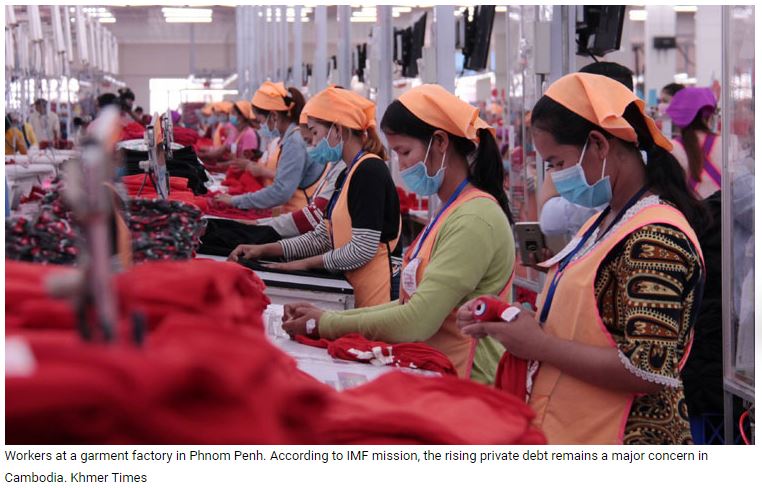IMF raises concern over Cambodia’s rising pvt debt
While forecasting a five percent growth for Cambodia’s economy this year, the visiting International Monetary Fund (IMF) mission yesterday said the rising private debt remains a big concern in the Kingdom and urged the National Bank of Cambodia (NBC) to strengthen its vigil.
Addressing the media at a virtual press conference following the two-week-long annual Article IV consultation for Cambodia, IMF Mission Chief Alasdair Scott expressed confidence in the long-term growth forecasts for the country. The Mission maintained a forecast of 5.5 percent growth in Cambodia’s Domestic Product (GDP) for 2023 and six percent in the year after.
The Mission listed developments in China, tightening of monetary policy by foreign powers, the ongoing Russia-Ukraine war, rise in the prices of commodities and a weakening external demand as some of the current concerns for the country.
“The domestic inflation is peaking and will come down to pre-pandemic levels soon. What worries us more is the external inflation, especially due to the high energy prices. But there too we are seeing a respite as the price of a barrel of oil has come down to $80 from $110 a few months ago,” Scott said.
The Mission also forecasted a fall in fiscal deficit from the high of seven percent in 2021, rose mostly due to the impact of Covid-19, to four percent in 2023 and assessed that the prospects of it narrowing further were bright.
“Also, Cambodia’s public debt remains low and continues to be at the sustainable level,” Scott said.
For private debt, the Mission recommended that NBC step up its supervision. “NBC should gradually restore monetary conditions to the pre-pandemic era such as minimum requirement levels for banks,” he said.
Cambodia’s private debt accounted for 140.31 percent of its nominal GDP in December 2021, according to some estimates.
The Mission, meanwhile, also encouraged the government to continue with the Covid-19 Cash Transfer Scheme for the vulnerable sections of the population, saying that it would help them face the rising inflation.
In the longer term, public spending would have to be increased to cover the rising costs of education, healthcare, infrastructure development and energy demands. The government would also need to address climate change concerns with additional expenditure, it said.
The Mission found that the current account deficit for the country went up in 2021 due to the rising costs of imports, especially the volatility in gold imports. But this can be brought down through the rising exports and steady improvement in productivity.
“Export orders for garments are strong and the prospects of getting more international tourists in the coming months are also bright. The 5.5 percent growth in manufacturing is commendable,” Scott said.
The Mission highlighted the government efforts to have Free Trade Agreements (FTAs) with more countries and the new Investment Law brought in 2021 as welcome steps to boost exports. But it wanted the government to address the implementation challenges of such progressive laws as well.
But the IMF team warned that there could be a dip in exports for the rest of the year due to a fall in demand especially from the European countries as they are struggling with high energy prices following the Ukraine crisis.
The Mission also offered technical assistance to NBC to speed up the de-dollarization of the economy. Currently, 90 percent of the bank deposits in the country are in foreign currency. “Raising the use of the domestic currency will give NBC more control over its monetary policies,” Scott pointed out.
Source: https://www.khmertimeskh.com/501154677/imf-raises-concern-over-cambodias-rising-pvt-debt/


 Thailand
Thailand




